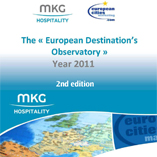Hotel performances in 2011 : what we can learn from the second edition of the ECM-MKG Hospitality « European Destination’s Observatory »?

It is important to observe that for the 27 countries in the European Union plus Switzerland, the results of the hotel business for 2011 are positive. No country closed the year with a downturn for its reference indicator –the RevPAR– even if there is a broad range between stagnation in Switzerland (+0.4%) and strong improvement in Poland (+9.4%). While on the one hand Switzerland is already positioned among the highest levels of performance, on the other Poland occasionally benefited from its six-month presidency of the European Union. The European countries with the strongest hotel activity –United Kingdom, France, Germany or the Benelux– are positioned within a tighter range: between 4% and 6% growth, which better reflects the state of Europe’s marketplace.
\n
With an average European occupancy rate higher than 66%, hotel occupancy gained 2 points over 2010, which was already in a strong recovery over the crisis of 2009. The prize goes to the international gateways, capitals and business cities: Amsterdam, Berlin, Ghent, Hamburg, London, Munich, Paris and Zürich, which flirt with or surpass an OR of 75% across the year. With an OR close to 85% London beats all records, and is close to saturation. At the bottom of the table, Spanish cities (Saragossa, Seville) and Italian ones (Bologna) reflect the difficulty of the national markets. Even cities with highly seasonal business that depends on exhibitions and fairs (Cannes and Hanover), progressed in 2011. The rare drops in occupancy with respect to 2010 are minimal, largely less than 1 point.
\n
This strong demand justified a significant improvement in the average daily rate (for many cities around 4% and more), an indicator of the shift of the vast majority of European cities into the upper part of the hotel cycle. Only a few German cities (Berlin, Leipzig, Munich, Nuremberg), Italian cities (Florence, Turin) and Spanish ones (Bilbao, Madrid, Saragossa) activated the rate dynamic to boost or relaunch demand.
\n
The question mark bears on the prolongation of the slump observed in year-end business. The degradation of national economies, the concern about the impact of debt, and austerity measures have an evident effect on the average slump observed in Europe where the OR and ADR fell into the red last December. Past experience taught that the midscale and upscale segments reacted more visibly to the change in economic climate. In cities where the weight of these categories is preponderant (Central Europe, Scandinavian countries, Spain and Italy…), the stabilizing effect of the economy hotel segment was impotent.
\n
\n
Source: MKG Hospitality: www.mkg-group.com
\n